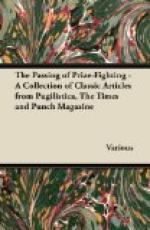OPERATIC NOTES.
Wednesday.—Crowded for WAGNER’s Goetterdaemmerung, “which,” says the Rev. Mr. Penley, who “doesn’t like London,” “is such an awful name, that fond as I am of music, I really could not go and see it.” As to WAGNER, well, “it’s all right when you know him, but you’ve got to know him fust.”
Herr ALVARY excellent as Siegfried; Herr WIEGAND powerful; ditto the wide-awake Herr KNAPP. Frau KLAFSKY, a beautiful and interesting Bruennhilde; and it is difficult to be personally interesting in a Wagnerian Opera, where ensemble is everything. Fraeulein HEINE and BETTAQUE, equally good.
Herr MAHLER was “called,” with the rest of the company, to receive his meed of praise for conducting. Opera perfectly put on Stage by Herr von DRURIOLANUS, and though the Season is coming to an end, yet the Opera is still “going strong.”
* * * * *
NOTE AND QUERY BY MRS. R.—Our old friend wants to know from what Poet comes this quotation—
“A needless Salamander ends the line.”
Mrs. R. thinks it’s from POPE; but if so, she asks what Pope? as there are so many of ’em.
* * * * *
ORNAMENTAL STRUCTURE IN NEW NORFOLK.—A Triumphal ARCH.
* * * * *
STUDIES IN THE NEW POETRY.
NO. IV.
In offering this fourth example of the New Poetry to his readers, Mr. Punch wishes it to be distinctly understood, that he is in no way responsible, personally, for the curious mixture of divinities and semi-divinities who figure in it. It is one of the distinguishing marks of this particular sort of New Poetry to pile up a confusion of more or less mythological names in a series of swinging and resonant lines. In one line the reader may imagine himself to be embarked in the River Cocytus. In the next, he will be surprised to find himself in Eden. Blood, battle, bumptiousness, and an aggressive violence, are special characteristics of this style of writing. Some of the lines apparently mean nothing at all, others are calculated to make timid people tremble; and the effect of the whole is generally picturesque, lurid, and uncomfortable.
One of the great advantages of a poem like this, is that it may be used for all kinds of purposes. For example, if it was originally written as an invective against an opponent, it may afterwards, with the utmost ease, be made to serve as a threnody. Here then without further preface is:—
THE SUNDERED FLEA.
BY MR. R*DY*RD K*PL*NG.
Out on the path of the blazing ball that
has hurtled a million
years,
Where the uttermost light glows red by
night in the clash of the
angry
spheres,
Where never a tear-drop dims the eye,
and sorrows are stifled young,
And the Anglo-Indians snigger and sneer
with the jest of a bitter
tongue.




